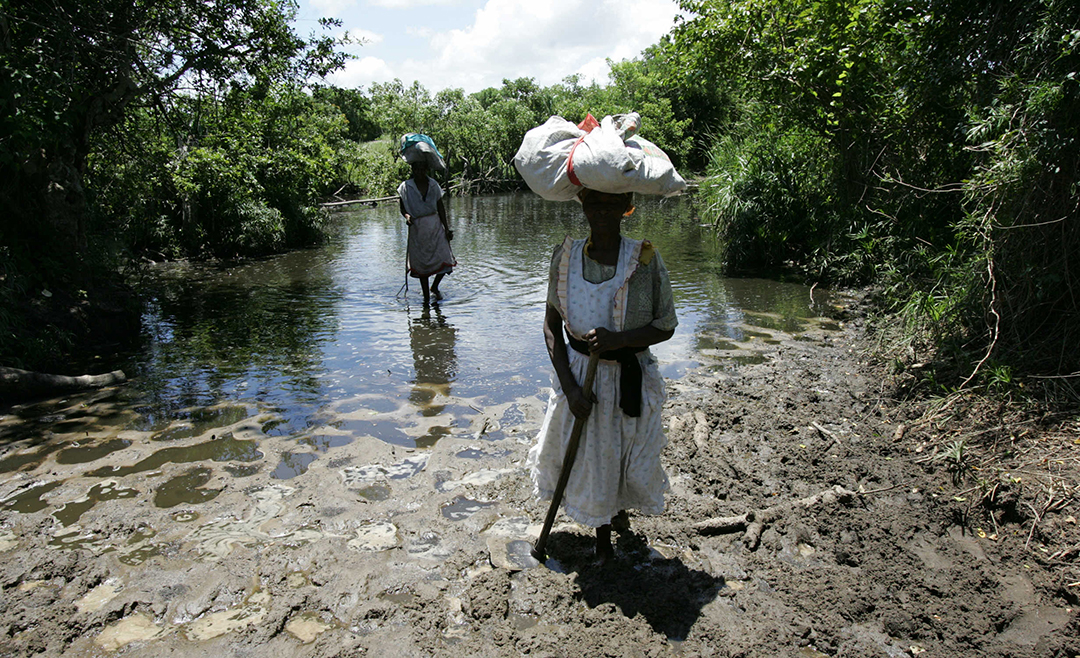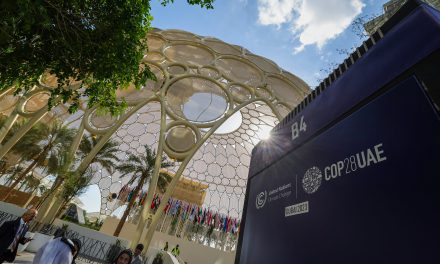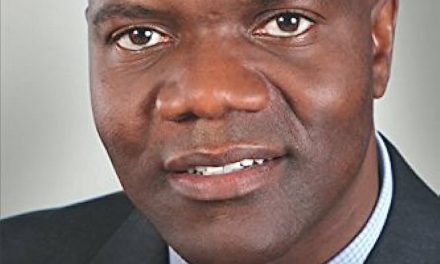
Women return home from their swampland farm in the Greater St Lucia Wetlands Park, one of Africa’s biggest and endangered wetlands, a 260,000-hectare protected area in eastern South Africa, Photo: Alexander Joe/AFP
Adaptation, the climate buzzword for restoring and protecting delicate ecosystems, and the financing of adaptation initiatives, were at the top of the Glasgow COP26 agenda. To give proper effect to adaptation, however, African governments have a lot of local work to do in terms of practising good environmental governance.
The protection of wetlands is a case in point. This is particularly critical in Africa’s cities, which face challenges in the delivery of climate-sensitive services such as water supply, sanitation, and waste removal. Through well synchronised legislative and institutional frameworks for wetlands management, African governments must translate their commitments into rapid action by tapping into this natural and cost-effective resource. Malawi, South Africa, and Zimbabwe provide pertinent examples of both good and bad environmental governance practices when it comes to preserving wetlands.
For our dynamic GGA webinar examining COP26 issues, click here
Wetlands, an important resource
Wetland International (WI) defines wetlands as distinct ecosystems, often flooded by water either permanently or seasonally, an essential system vital to human life.
- Wetlands are critical in addressing climate change. They act as natural buffers by controlling the intensity of floods while some protect against storm surges.
- They have an economic value five times higher than tropical forests and provide numerous recreation activities such as fishing, bird and wildlife watching, and hiking, in part because they are such vital tourist attractions, with mostly rural economies across Africa depending on them.
- They are an important source of fresh water, and act as a filter, as they improve water quality in nearby rivers and streams.
- They are habitats for diverse species of mammals, reptiles and birds. The Sudd wetland in Southern Sudan and Ethiopia is a known example of a dry season refuge for a large number of inter-African bird migrants and also has a rich and abundant fish population.
The current state of Africa’s wetlands
WI observes that Africa has some of the most biologically diverse and productive ecosystems, covering more than 131 million hectares. Wetlands constitute about 1% of Africa’s total surface area, a significant coverage compared to Europe.
Globally, wetlands are depleting three times faster than forests. For South Africa in particular, 48% of wetlands are critically endangered, and the country has lost 50% of its original wetland area. The loss of wetlands can be attributed to many factors, such as the impact of climate change, population increase and urbanisation, and change in land use. The pressure from human activities is expected to increase as population grows. The prospect of profits from recently discovered oil, coal and gas deposits has also led to an increase in on-and offshore exploration, and mining in sensitive ecological areas.
The World Wide Fund for Nature (WWF) cites “wetland blindness” as one of the reasons wetlands are undervalued in Africa. In South Africa, for example, this wetland blindness explains why wetlands were once considered valueless wastelands for which the government provided incentives to farmers to convert them to agricultural land, altering and degrading them in the process. Under the Ramsar Convention, an international treaty for the conservation and sustainable use of wetlands, South Africa currently has 27 sites designated as wetlands of international importance, with a surface area of 571,089 hectares (about one quarter of the surface area of the Kruger National Park).
In Malawi, the Environmental Association of Journalists (EAJM) advocates for the “nurturing of the country’s 20% of wetlands for posterity”. In the same vein, the Malawi Local Government Association (MALGA) has called for the demolition of illegal structures near wetlands. This suggests that it is not entirely lack of awareness or knowledge that has led to the disregard of wetlands. It is evident that over the years there has been increasing awareness about the need to preserve wetlands. However, it is incumbent upon African governments and their leaders to create enabling environments for the effective implementation of good environmental governance laws.
Zimbabwe is an example of how, over the last few years, housing, malls and other land use activities such as mining have been allowed to sprawl on and around wetlands. This continues in spite of Zimbabwe acceding to the Ramsar convention in 2013. Further to this, expert advisory and civil society advocacy calls to combat this have not deterred the destruction of the country’s wetlands. According to the Zimbabwe National Wetlands Masterplan of 2021, 55% of wetlands are moderately degraded while 26% are severely damaged. In an interview with GGA, Dorothy Wakeling of the Conservation Society of Monavale (COSMO)2 notes with caution, in her analysis of the masterplan, that:
There is nothing like a moderately damaged wetland.… either a wetland is damaged, or it is not…if you build on a wetland, you lose it. But the buildings can be removed, and wetlands restored – but it will take time.
The Everglades restoration experience confirms this key observation, that preservation always beats restoration, for wetlands and forests especially. The Comprehensive Everglades Restoration Plan (CERP) was enacted to restore portions of the Everglades, Lake Okeechobee, the Caloosahatchee River, and Florida Bay to undo the damage of the past 50 years. It would take 30 years and cost $7.8 billion to complete. Although the plan was passed into law in 2000, it has been compromised by political and funding problems.
From this example, the future of wetlands therefore lies in governments exercising the necessary political will to ensure their protection. However, in spite of protection policies in place, political interference and corruption are at the heart of bad environmental governance in many countries, including Zimbabwe. Farai Maguwu, the Director of the Centre for Natural Resource Governance (CNRG), in an interview with Good Governance Africa, revealed that “Zimbabwe has good environmental management laws designed to protect the environment, wetlands included… however, since proclamation of the Look East Policy in 2003, Zimbabwe has lowered its environmental standards to please investors.”
Regional and international strategies to protect Africa’s wetlands.
Sustainable Development Goal 6 (SDG6) is one notable international strategy to protect wetlands. Within its broader mission to “ensure availability and sustainable management of water and sanitation for all”, its target 6.6 specifically focuses on protecting and restoring water related ecosystems. SDG6 therefore provides a framework for African governments to proactively address the adverse effects of climate change on their water ecosystems.
In addition to SDG6, a majority of the Southern African Development Community (SADC) member states have acceded to the Ramsar Convention, which mandates the ‘wise use’ of all wetlands through local and national actions and international cooperation. The convention, underpinned by three pillars, calls on its signatories to: designate Wetlands of International Importance; work towards the wise use of all wetlands through national land-use planning and appropriate policies, and; cooperate internationally concerning trans-boundary wetland ecosystems.
Further to this, under the African Union (AU) and the SADC, member states are party to various Multilateral Environmental Agreements (MEAs) that require country-level commitments that can be furthered through regional cooperation. Through the AU and SADC, states have a platform for coordinating various conventions and protocols instituted for the advancement of good environmental governance as a block. In addition to coordinating a regional approach to the Ramsar Convention, these platforms enable the furthering of the United Nations Framework Convention on Climate Change (UNFCCC), the Kyoto Protocol and the Convention on Biological Diversity, among others.
Importantly, given the critical role of water resources to regional development, SADC’s instruments for water cooperation include the:
- Regional Water Policy, adopted in 2005
- Regional Water Strategy adopted in 2006
- Regional Strategic Action Plan on Integrated Water Resources and Development Management – first approved by SADC Summit in August 1998 to run in five-year phases.
The Water division is tasked with the responsibility for furthering cooperation on water related issues within the SADC Secretariat.
These measures indicate African governments’ consciousness of the centrality of good environmental governance to the attainment of sustainable development for Africa’s citizens. However, some have done a good job while others, more than half a century later, are regrettably enabling bad environmental governance practices. The National Geographic notes that, “It’s been 50 years since an international treaty to protect wetlands was created but, around the world, wetlands are still disappearing three times faster than forests.” African governments must be more intentional about developing sustainable strategies for the protection and restoration of wetlands through requisite legislative reform.
How can Africa’s wetlands be better protected ?
Africa’s wetlands can be better protected if they are prioritised and secured within the Paris Agreement’s mitigation, adaptation and financing commitments. An international support framework would be critical to ensure efficacy of national level measures given African nations’ increasing debt amidst setbacks occasioned by the COVID-19 pandemic and reduction in official development assistance. Tom Kabii, a technical officer for Ramsar’s Africa Bureau, advises that one of the highest priorities must be to save and preserve those wetlands that are still pristine. He further advises the integration of wetlands’ natural value into local economies, an observation that resonates with Dorothy Wakeling’s call for non-interference with wetlands and factoring them into national GDP accounting.
As African nations continue to push for the developed world to fulfil its climate finance obligations, African countries should take independent steps towards ensuring good environmental governance. A key starting point could include ensuring that wetlands protection constitutes part of countries’ Nationally Determined Contributions (NDCs) to climate change mitigation, in order to motivate private and public investments towards scaling up efforts. Zimbabwe, in October 2020, took steps towards comprehensive wetlands legislative reform through a Draft National Wetlands Policy, the purpose of which is “to guide wetlands management to become incorporated in development planning by the Government, private sector, development partners, traditional leaders, communities and individuals”. The efficacy of such commendable policy actions requires African governments to do more through:
- Advancing multi-sectoral efforts to ensure implementation and stronger enforcement of policies designed to combat political interference and corruption .
- Taking practical steps to restore and rehabilitate damaged wetlands and incorporate their natural value into development plans.
- Decentralising power from national bodies to local governing bodies and communities, and institutionalising their participation in a way that empowers them to challenge political interference, and demand and secure accountability when wetlands face the risk of violation.
- Providing environmental education and building early detection systems to help monitor the protection of wetlands.
- Broadening funding streams (including Public Private Partnerships) to ensure they do not rely solely on external financing or bailouts.
Clearly, Africa’s wetlands can only be better protected if governments go beyond the drafting of good policies but institutionalise and enforce environmental good governance practices. As Africa and the world now look to COP 27 in Egypt later this year, there is a strong need to continue harnessing nature-based solutions to amplify what’s already possible.
[activecampaign form=1 css=1]












